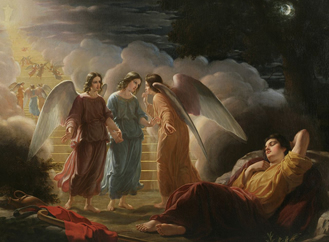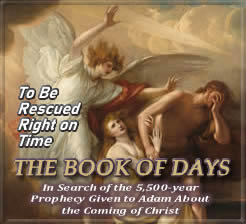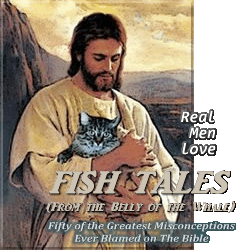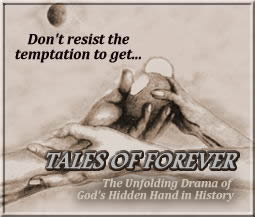On Earth as It is On Heaven
The Promise of America, Technology, and the New Earth
by W. Kent Smith
Because Jesus said His Kingdom isn’t “of this world,” many assume that only Heaven is worthy of being pursued, and that the Earth should be forever viewed as an enemy of God’s Kingdom. But nothing could be further from the truth.
Jesus didn’t say the Earth itself was unworthy or ungodly; He simply stated that His Kingdom wasn’t “of this world.” What’s more, the phrase “of this world” really just means it’s not “from this world.” Saying it’s not “of” implies an inherent incompatibility between Earth and this other place; but saying it’s not “from” just lets us know it didn’t originate on Earth but instead comes from somewhere else.
So, while one word—of—leads us to the traditional assumption that we need to leave here to go where Jesus is, the other word—from—lets us know that it came from another place and is now taking up residence as a new frontier of God’s expanding Empire.
This is the story of that new frontier and of that expanding Empire.
Now, you can learn the true story of the most important drama God has ever penned for humanity; you can embark upon a historic journey of discovery, in On Earth as It is On Heaven: The Promise of America, Technology, and the New Earth.
The only question that remains is: Will you?
Study Guides — Available Here
A Case for The Promise of America
EXHIBIT “A” — Its Themes that speak primarily of God’s Plan of the Ages—defining those that describe His relationship with individuals and nations where He acts as an Outsider by His own decree.
Its Key Themes:
God has never stopped viewing the Earth as being laid out in accordance with the destiny of the Children of Israel.
Nothing in Scripture teaches that we should treat the Earth as though it were nothing more than the devil’s domain.
Although nations endure while individuals come and go, God is just as concerned with the destiny of individuals as He is of nations.
Prior to the Fall of Man, Adam and Eve lived in the same world as God, but after the Fall, both God and man, by divine decree, became outsiders looking in.
God can transcend any problem this Universe can throw at Him.
The creation of the United States of America didn’t really begin in 1492, or 1620, or 1776, although one may rightly point to all of those dates as marking pivotal years in its creation.
Story Continues Below
Says Richard Price—the founder and CEO of Academia.edu—on his podcast In Depth With Academia:
On Earth as It is On Heaven: The Promise of America, Technology, and the New Earth is:
To hear Price’s book review of On Earth as It is On Heaven, CLICK HERE.
To watch author and historian W. Kent Smith discuss the contents of his book On Earth as It is On Heaven, at the Sacred Word Revealed Conference ‘23, hosted by Zen Garcia, CLICK BELOW.
Story Continues From Above
While it does seem as though God has taken a vacation concerning the history of nations, He has never checked out in regard to Israel as it relates to His plan to bless the whole world.
The most important promises God has ever made to humanity are those that are unconditional in nature, as they are promises He intends to keep regardless of whether or not the recipients cooperate in their fulfillment.
Despite the repeated failures of Israel’s descendants regarding God’s promise to bless the whole world through them, this never spelled the end of His plan to keep that promise.
One of the great mysteries of biblical prophecy, the Kingdom of Stone, described by the prophet Daniel, is rarely if ever spoken of in any sermon or commentary.
To read more about the Themes of The Promise of America, CLICK HERE.
EXHIBIT “B” — Its Prophecies that speak primarily of God’s Unconditional Promises—defined as those that He intends to keep despite humanity’s inability to live up to them.
Its Key Prophecies:
When the Most High divided their inheritance to the nations, and when He separated the sons of Adam, He set the boundaries of the peoples according to the number of the Children of Israel. But the Lord’s portion is His people, Jacob is His allotted inheritance. (Deuteronomy 32:8-9)
“No weapon forged against you will prosper, and you’ll refute every tongue that accuses you. This is the heritage of the servants of the Lord, and this is their vindication from Me,” declares the Lord. (Isaiah 54:17)
Look to Abraham your father, and to Sarah who gave you birth. When I called him, he was but one; then I blessed him and multiplied him. (Isaiah 51:2)
I will make your offspring like the dust of the Earth, so that if one can count the dust, then your offspring can be counted. (Genesis 13:16)
So I tell you, the Kingdom of God will be taken away from you and given to a nation that will bear fruit. (Matthew 21:43)
Blessed are the meek (tamed ones), because they will inherit (take possession of) the Earth. (Matthew 5:5)
They won’t hurt or destroy in all My holy mountain: for the Earth will be full of the knowledge of the Lord, as the waters cover the sea. (Isaiah 11:19)
The Scriptures foresaw that God would justify the Gentiles by faith, and foretold the gospel to Abraham: “All nations will be blessed through you.” (Galatians 3:8)
From one man He made every nation of men, that they should inhabit the whole Earth; and He marked out their appointed times in history and the boundaries of their lands. God did this so that they’d seek Him and perhaps reach out and find Him, though He isn’t far from any one of us. (Acts 17:26-27)
You ignored the Rock Who brought you forth; you forgot the God Who gave you birth. When the Lord saw this, He rejected them; provoked to anger by His sons and daughters, He said: “I will hide My face from them. I’ll see what their end will be. For they’re a perverse generation—children of unfaithfulness. They’ve provoked My jealousy by that which is not God; they’ve enraged Me with their worthless idols. So I’ll make them jealous by those who are not a people; I’ll make them angry by a nation without understanding.” (Deuteronomy 32:18-21)
To read more about the Prophecies of The Promise of America, CLICK HERE.
EXHIBIT “C” — Its Words that speak primarily of God’s Dividing of the Earth—defining those that He has reserved pertaining to the Inheritance of the Children of Israel.
Its Key Words:
Verse in question and its words: When the Most High divided their inheritance to the nations, and when He separated the sons of Adam, He set the boundaries of the peoples according to the number of the Children of Israel. But the Lord’s portion is His people, Jacob is His allotted inheritance. (Deuteronomy 32:6-8)
When Genesis describes the “spreading out” of Noah’s sons after the Great Flood, where the Hebrew word is parad, we find that The Book of Deuteronomy uses two words that are both derivatives of this same root word—when the Most High “divided” their inheritance to the nations, and when He “separated” the sons of Adam. Of similar interest, when the King James Version of The Bible uses the alternative word “gave,” in reference to this inheritance of the nations, Strong’s Exhaustive Concordance makes the meaning of this word clear in the Hebrew, where the English does not. In God’s “giving” of this inheritance to the nations, it is specifically a giving that speaks of it being “distributed,” “apportioned,” or “divided” among the various recipients.
Verse in question and its words: Blessed are the meek, because they will inherit the Earth. (Matthew 5:5)
This word “meek” is translated from the Greek word, praus, which doesn’t at all describe someone who is timid or feeble, as we’ve been led to believe by any traditional view of this word. The word praus actually describes the taming of the wild horses that were used in the Roman Coliseum.
For this word “inherit,” the word is used, in The Old Testament, in the context of the Israelites taking possession of the Promised Land, as in when they were told to destroy the inhabitants of Canaan and possess Palestine, now that the “fullness of the Amorites was complete.”
Verse in question and its words: So the Lord scattered them from that place, and they stopped building the city. That’s why it’s called Babel, because there the Lord confused the language of the whole world, and from there the Lord dispersed them into all the Earth. (Genesis 11:8-9)
Just as the word parad spoke of Noah’s sons “dispersing” across the face of the Earth, we find a similar Hebrew word employed here. Nimrod and his minions declared they wouldn’t be “scattered.” The word in this instance, which is very similar, etymologically, to parad, is puwts. In using this word puwts, we see how God had the final word in this scenario, in that Scripture declares: So the Lord “scattered” them, puwts, from that place, and “dispersed” them, puwts, across the face of the Earth, just as He’d originally commanded them to do.
Verse in question and its words: How lovely are your tents, oh Jacob, and your tabernacles, oh Israel! Like valleys they spread out, like gardens beside a river, like aloes planted by the Lord, like cedars beside the waters. He will pour the water out of his buckets, and his seed will be in many waters, and his king will be higher than Agag, and his kingdom will be exalted. (Numbers 24:5-7)
In this instance, we see Balaam speaking of the tents of Jacob “spreading out” like gardens beside a river and cedars “beside the waters,” and the “seed” of Israel being “in many waters.” In describing the tabernacles of Israel in this way, Balaam wasn’t just echoing the same idea that describes the inexorable worldwide migration of the sons of Adam, Noah, and Abraham. He was also providing us with two reinforcing ideas important to this study of God’s expanding Empire.
Balaam also used another word that’s critically important to this study of the various migrations of God’s people. The word is one that Balaam used when he spoke of the “seed” of Israel that “will be in many waters.” That Hebrew word is zera, meaning not just “seed,” in the sense of “children,” or “descendants.” According to Strong’s Exhaustive Concordance, this word zera also speaks “especially of the seed of David as anointed to reign” and “as sitting on a throne.” As it is written: “The Lord is a tower of salvation to His king, and He shows mercy to His anointed, to David and his descendants forevermore.” This is borne out by the fact that when Balaam spoke of these descendants, he didn’t just speak of the descendants of Israel in general. If you notice, he said, “His seed will be in many waters, and his king will be higher than Agag, and his kingdom will be exalted.”
What’s more, this word zera carries with it a similar meaning from another Hebrew word, from which it’s derived; that word is zara. It just so happens that the word zara provides us with another clue to solve the mystery of who and where to find this “other people” with whom God plans to make the original Israelites jealous and angry. That’s because this word zara doesn’t contain just the idea of sowing seeds locally, but it also carries the idea of a worldwide scattering of seeds, or descendants. We see this idea expressed in numerous biblical passages, such as:
Verse in question and its words: I will strengthen the House of Judah, and I will save the House of Joseph. I’ll bring them back because I have compassion on them, and they’ll be as though I had never rejected them, for I am the Lord their God, and I’ll answer them. Though I scattered them among the nations, yet in faraway countries they’ll remember Me, and with their children they’ll live and return. (Zechariah 10:6, 9)
In this root Hebrew word zara, which speaks of the scattering of Abraham’s descendants, we have yet another clue to solve this great whodunit of the ages. Not to be missed in all this talk of royalty is something that’s completely lost in any English translation of The Bible. This word zara just happens to describe more than the scattering of Israel’s seed; it’s also the name that was chosen at the birth of one of Judah’s twin sons, Zarah, from the Hebrew word zerach, which means “dawning,” or “radiance,” as in, a “scattering of light.” The psalmist had this very thing in mind when he wrote: “Light is sown for the righteous, and gladness for the upright in heart.”
Verse in question and its words: When the time came for Tamar to give birth, there were twin boys in her womb. As she was giving birth, one of them put out his hand; so the midwife took a scarlet thread and tied it on his wrist, and said, “This one came out first.” But when he drew back his hand, his brother came out, and she said, “So this is how you have broken out!” And he was named Pharez. Then his brother, who had the scarlet thread on his wrist, came out; and he was named Zarah. (Genesis 38:16-30)
Before the twin sons of Judah even had a chance to grow up and make their own mark on the world, their naming already conveyed an important lesson about God’s control over history and His faithfulness to mankind. In the case of Zarah and Pharez, their names can be translated in various ways, all of which have important implications to this work, and which in turn lead us to a greater appreciation of the role played by these forebearers of every king and queen to be born of the House of Israel and the House of Judah. Pharez can mean “breach,” “breaker,” “break out,” “burst forth,” “division,” “disperse,” “spread abroad,” “rupture,” and “blossom.” Notice how, in addition to introducing new word meanings such as “breach,” “breaker,” and “break out,” we see the connection this word has with previous words we’ve already discussed, such as “division,” “disperse,” and “spread abroad.”
Zarah can mean “seed,” “descendant,” “scatter,” “sow,” “winnow,” “disperse,” “dawning,” “radiance,” and “sift.” Notice how, in Zarah’s case, in addition to conveying the meaning of “dawning” and “radiance,” which is what we saw earlier with this word’s connection with “light,” we also see a clear overlapping of meaning, in connection with previous words we’ve looked at, such as “scatter,” “sow,” and “disperse.” By way of what God intended to do, then, via the migratory drama of these regal twins, we catch a glimpse in their prophetic names: Zarah—in the “sowing” of light amongst all the nations of the world—and Pharez—the “break out” point from which those dispersed ones would venture forth with the blessing of Abraham.
To read more about the Words of The Promise of America, CLICK HERE.






